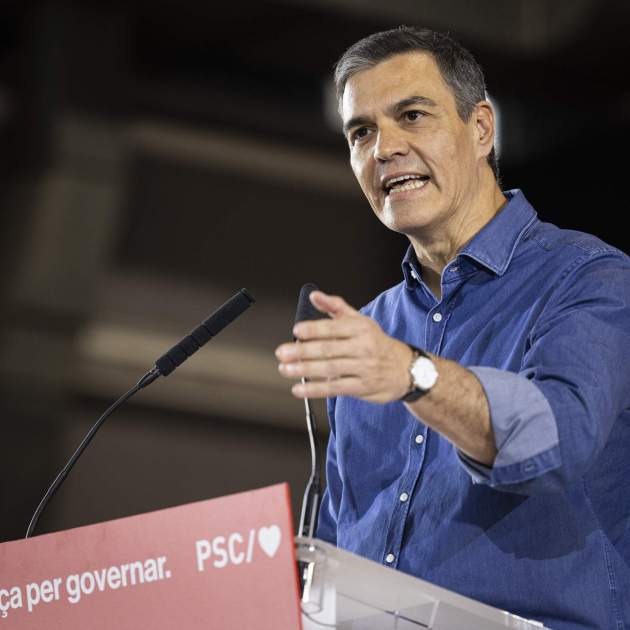Spanish prime minister Pedro Sánchez has "completely" ruled out allowing Carles Puigdemont to return to preside over the Generalitat of Catalonia. "He has to accept reality", he said when asked this Friday if, in order to preserve his stability in the Spanish government, he would consider the possibility of letting the leader of Together for Catalonia (Junts) return to power in the Palau de la Generalitat. In fact, he compared the exiled Catalan president with Alberto Núñez Feijóo: he recalled that the leader of the People's Party (PP) sought to win last year's Spanish general election and join forces with Vox to become head of the Spanish executive. "Puigdemont is in a similar situation, but neither did he win the election nor gain a majority; he doesn't have the numbers, so he can only do what Feijóo did and consider himself the legitimate president", he added. On the other hand, he has begun to pave the way to pressure the PP in case the Catalan Socialists' (PSC) attempt to govern in Catalonia is blocked by the Republican Left (ERC): "I am surprised that the PP has not made a reflection on what they will do over the investiture of Salvador Illa: will they facilitate it or not?" The PP itself were quick to reply, observing that, given how the Spanish prime minister has previously changed his mind on the pro-independence parties, "his word has no value".
Pedro Sánchez: "If there was a triumph on May 12th, it was of social co-existence, agreement and the overcoming of conflicts through politics... but Puigdemont could do what Feijóo has done."
In an interview with TV channel La Sexta, the Socialist leader affirmed that Catalan voters had endorsed his strategy to deflate the political conflict between Catalonia and Spain last Sunday at the polls. "Catalan society does not only say that it is necessary to support the progressive government, but that they want to be an active part of the plural and diverse construction from progressive parameters", he stated, besides assuring that today, a few days after the election, "many voters of the PSOE will better understand the decision we made to opt for coexistence". Asked if he is would declare the independence process as dead, he claimed that "the Catalans have said that it is over and they have opened a new era". "All roads lead to Illa", he summed up.
Puigdemont's argument for seeking to win the parliamentary vote to decide the next Catalan president is that, even if the pro-independence parties do not reach an absolute majority, he has a more natural alliance supporting him than that of Salvador Illa. That is: the three main parties of independentism have 59 seats. On the other hand, the PSC needs to join forces with pro-independence ERC and Comuns-Sumar to reach an absolute majority, which would imply a pact between Spanish unionists and independentists. The natural sum of the Catalan Socialists, which would only be with the Comuns, would group together only 48 seats.
The PP doesn't believe Sánchez: "His word has no value"
The People's Party (PP) continues to predict that the PSC will end up investing Carles Puigdemont as president of the Generalitat. A few minutes after the Spanish president, Pedro Sánchez, "completely" dismissed the idea and asked the Junts leader to "accept reality", the Spanish conservatives pooh-poohed the asssertion because it had come from the lips of a Socialist leader who has previously changed his mind on the pro-independence parties when matters of political expedience were involved. "Sánchez's word has no value because what he says today he will deny tomorrow purely out of interests", answered PP organizational deputy secretary Carmen Fúnez, when asked about this issue. And she added that you only have to go back to what Sánchez said about the amnesty before the July 23rd elections to "draw conclusions". The PP's institutional deputy secretary, Esteban González Pons, also echoed the same argument: "If the Spanish government depends on Puigdemont, Sánchez will do what [the Catalan] wants". "All other things are campaign lies", he concluded.
